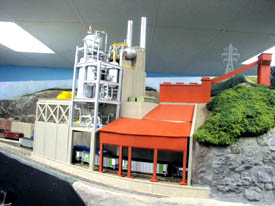|
DAILY NEWS ONLINE |
|
|
|
OTHER EDITIONS |
|
|
|
OTHER LINKS |
  |
Coal power to reduce electricity bill costs
|
|
|
President Chandrika Kumaratunga, who is in China on an official visit, initiated this project and the MoU was signed between Ceylon Electricity Board General Manager and China National Machinery and Equipment Import and Export Corporation (CMEC) which has proposed to design-build-transfer the coal power plant.
The project is scheduled to start by October this year and will initially add 300 MW to the National Grid. First phase of the 300 MW project will be commissioned in 2009, the second and third stages will get underway in 2011 and 2012. It is anticipated that under a credit loan scheme, the overall electricity charges will come down by as much as 13 per cent in 2010, 22 per cent in 2011 and 32 per cent in 2012.
The Norochcholai power project is the single largest power project undertaken in Sri Lanka costing US$. 380 million.
Work on the Norochcholai coal plant, has been obstructed for nearly two decades due to opposition from environmental and political groups.
Minister of Environment, A. H. M. Fowzie said that they do not see any environment concern by commissioning of the Norochcholai coal plant. "Surveys have been done in this regard," he said. India too has over 50 coal power plants and have not had any environmental problems.
Sri Lanka has been classified as a country, which has the highest electricity bills.
According to an official of the CEB electricity charges will fall by up to 13 percent in 2010 and by up to 32 percent in 2012 due to the new coal plant.
Energy Specialist Dr. Tilak Siyambalapitiya said that the decision taken by the President to go ahead with the power plant is a great achievement to the country. "This is something that was discussed 20 years ago and was not implemented to date," he said.
He said that that the annual requirement of power from 2010 would 300 megawatts and this would meet that expected demand.
After commissioning the plant it would be able to produce electricity for around Rs. Rs. 3.80 per unit and after five years the cost would rise to RS. 4 70 since the loan repayment commences. The loan would be re-paid in 20 years and by that the production cost would come down once again to around Rs. 3.50. "This is would be the biggest advantage the project would have for the economy," he said.
When the project is totally completed it would account for 48 percent of the total energy requirement of the country.
He also said that the basic raw materiel coal deposits would be available at least for 300 more years and this investment therefor is viable. The raw materials are expected to be imported from Australia, South Africa and Indonesia.
The Government has also approved the construction work of the first phase of the Upper Kotmale Hydropower Project which would begin next week. The estimated cost of the project will be Rs. 30 billion.
Mayeda Institute of Japan will carry out the construction activities under the supervision of the Ceylon Electricity Board.
The capacity of the power project will be 150 megawatts.
Meanwhile, the Institution of Engineers, congratulated the Government and the Ceylon Electricity Board on the signing of the agreement with the Chinese Government for the setting up of the Coal Power Generation Project at Norochcholai.
|
|

